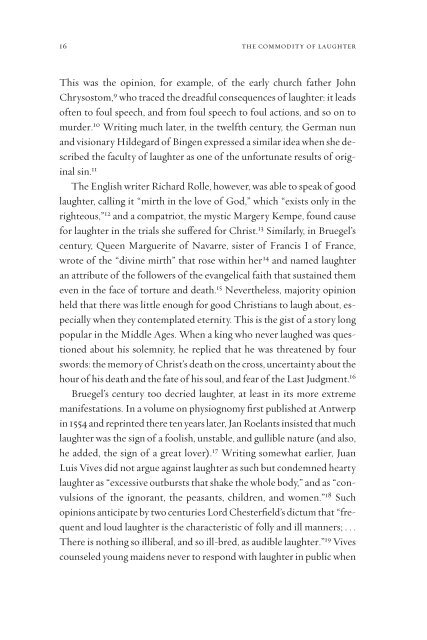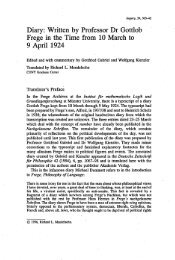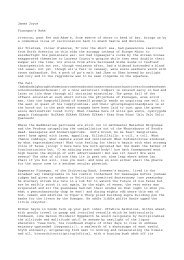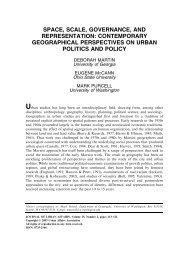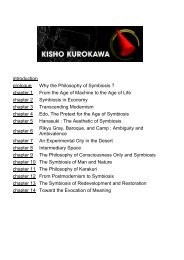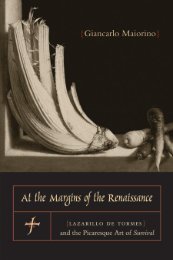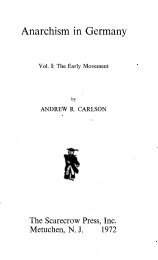Pieter Bruegel and the Art of Laughter - AAAARG.ORG
Pieter Bruegel and the Art of Laughter - AAAARG.ORG
Pieter Bruegel and the Art of Laughter - AAAARG.ORG
Create successful ePaper yourself
Turn your PDF publications into a flip-book with our unique Google optimized e-Paper software.
16 <strong>the</strong> commodity <strong>of</strong> laughter<br />
This was <strong>the</strong> opinion, for example, <strong>of</strong> <strong>the</strong> early church fa<strong>the</strong>r John<br />
Chrysostom, 9 who traced <strong>the</strong> dreadful consequences <strong>of</strong> laughter: it leads<br />
<strong>of</strong>ten to foul speech, <strong>and</strong> from foul speech to foul actions, <strong>and</strong> so on to<br />
murder. 10 Writing much later, in <strong>the</strong> twelfth century, <strong>the</strong> German nun<br />
<strong>and</strong> visionary Hildegard <strong>of</strong> Bingen expressed a similar idea when she described<br />
<strong>the</strong> faculty <strong>of</strong> laughter as one <strong>of</strong> <strong>the</strong> unfortunate results <strong>of</strong> original<br />
sin. 11<br />
The English writer Richard Rolle, however, was able to speak <strong>of</strong> good<br />
laughter, calling it “mirth in <strong>the</strong> love <strong>of</strong> God,” which “exists only in <strong>the</strong><br />
righteous,” 12 <strong>and</strong> a compatriot, <strong>the</strong> mystic Margery Kempe, found cause<br />
for laughter in <strong>the</strong> trials she suªered for Christ. 13 Similarly, in <strong>Bruegel</strong>’s<br />
century, Queen Marguerite <strong>of</strong> Navarre, sister <strong>of</strong> Francis I <strong>of</strong> France,<br />
wrote <strong>of</strong> <strong>the</strong> “divine mirth” that rose within her 14 <strong>and</strong> named laughter<br />
an attribute <strong>of</strong> <strong>the</strong> followers <strong>of</strong> <strong>the</strong> evangelical faith that sustained <strong>the</strong>m<br />
even in <strong>the</strong> face <strong>of</strong> torture <strong>and</strong> death. 15 Never<strong>the</strong>less, majority opinion<br />
held that <strong>the</strong>re was little enough for good Christians to laugh about, especially<br />
when <strong>the</strong>y contemplated eternity. This is <strong>the</strong> gist <strong>of</strong> a story long<br />
popular in <strong>the</strong> Middle Ages. When a king who never laughed was questioned<br />
about his solemnity, he replied that he was threatened by four<br />
swords: <strong>the</strong> memory <strong>of</strong> Christ’s death on <strong>the</strong> cross, uncertainty about <strong>the</strong><br />
hour <strong>of</strong> his death <strong>and</strong> <strong>the</strong> fate <strong>of</strong> his soul, <strong>and</strong> fear <strong>of</strong> <strong>the</strong> Last Judgment. 16<br />
<strong>Bruegel</strong>’s century too decried laughter, at least in its more extreme<br />
manifestations. In a volume on physiognomy first published at Antwerp<br />
in 1554 <strong>and</strong> reprinted <strong>the</strong>re ten years later, Jan Roelants insisted that much<br />
laughter was <strong>the</strong> sign <strong>of</strong> a foolish, unstable, <strong>and</strong> gullible nature (<strong>and</strong> also,<br />
he added, <strong>the</strong> sign <strong>of</strong> a great lover). 17 Writing somewhat earlier, Juan<br />
Luis Vives did not argue against laughter as such but condemned hearty<br />
laughter as “excessive outbursts that shake <strong>the</strong> whole body,” <strong>and</strong> as “convulsions<br />
<strong>of</strong> <strong>the</strong> ignorant, <strong>the</strong> peasants, children, <strong>and</strong> women.” 18 Such<br />
opinions anticipate by two centuries Lord Chesterfield’s dictum that “frequent<br />
<strong>and</strong> loud laughter is <strong>the</strong> characteristic <strong>of</strong> folly <strong>and</strong> ill manners; . . .<br />
There is nothing so illiberal, <strong>and</strong> so ill-bred, as audible laughter.” 19 Vives<br />
counseled young maidens never to respond with laughter in public when


